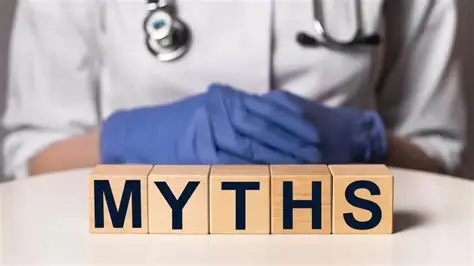From “carbs make you fat” to “you must drink eight glasses of water daily,” the world of wellness is full of half-truths and misconceptions.
Introduction
We live in an age where information travels faster than ever and unfortunately, misinformation travels even faster.
Health advice spreads through social media, friends, and old-school wisdom, often without any scientific backing.
Some of these myths sound convincing because they’ve been repeated for decades, but they can lead to unnecessary anxiety, bad habits, or even health risks.
In this article, we’ll unpack ten of the most common health myths people still believe. For each one, you’ll find the myth and then the truth so you can separate fact from fiction and make smarter choices for your health.
Common Myths That Won’t Die Easily
These health beliefs sound harmless and even helpful but they’ve stuck around despite modern science proving otherwise. Let’s break down the ten most persistent ones and see what’s really true.
1. The “8 Glasses of Water a Day” Rule
Myth: Everyone must drink eight glasses of water every day to stay healthy.
Truth: While hydration is vital, there’s no universal rule for how much water each person needs. Your requirements depend on your age, body size, diet, activity level, and environment. Some people need less, while others, especially athletes or those in hot climates need more.
2. Carbs Make You Fat
Myth: Eating carbohydrates leads to instant weight gain.
Truth: Carbs themselves don’t cause fat gain eating too many calories does. Your body needs carbohydrates as its primary energy source.
The issue lies in the type of carbs consumed. Refined carbs (like white bread, pastries, and soda) spike blood sugar and contribute to fat storage, while complex carbs (like oats, brown rice, and legumes) promote satiety and support metabolism.
3. You Can Detox Your Body with Cleanses or Teas
Myth: Detox teas, juice cleanses, or “flushes” can remove toxins from your body.
Truth: Your liver, kidneys, lungs, and skin already detoxify your body naturally and they do it 24/7.
Most detox products simply cause water loss or mild diarrhea, giving the illusion of cleansing without removing real toxins.
Instead of spending money on cleanses, support your natural detox system by eating fiber-rich foods, staying hydrated, exercising, and getting enough rest.
MUST READ:Top 10 Nutrient-Dense Foods for a Healthier Lifestyle
4. All Fats Are Bad for You
Myth: To lose weight and stay healthy, you should avoid fats altogether.
Truth: This outdated myth came from the “low-fat” craze of the 1990s, but science has since proven that not all fats are bad.
Unsaturated fats found in foods like avocados, olive oil, nuts, and fatty fish help regulate hormones, protect your heart, and support brain health.
5. You Must Work Out Every Day to Stay Fit
Myth: Skipping a day at the gym ruins your fitness progress.
Truth: Overexercising without rest can actually stall your progress, cause fatigue, and increase the risk of injury. Muscles grow and repair during rest, not during the workout itself.
Experts recommend at least 150 minutes of moderate exercise per week, with 1–2 rest days included. On off days, light movement like walking or yoga keeps your body active while allowing recovery.
6. Eating Late at Night Causes Weight Gain
Myth: Any food you eat after 7 p.m. automatically turns into fat.
Truth: Weight gain depends on total calorie intake, not meal timing. The reason late-night eating seems bad is that people often snack mindlessly on chips or sweets while watching TV.
If you’re genuinely hungry late at night, a small, balanced snack like yogurt, fruit, or nuts is fine.
7. The More You Sweat, the More Fat You Burn
Myth: Sweating buckets means you’re torching more calories.
Truth: Sweat simply helps your body regulate temperature. You might sweat heavily during hot weather or a sauna session without burning significant fat.
Fat loss happens when you maintain a calorie deficit burning more energy than you consume. The amount you sweat has nothing to do with how much fat you’re losing.
8. Taking Vitamins Means You Don’t Need a Balanced Diet
Myth: As long as you take supplements, your diet doesn’t matter.
Truth: Vitamins and supplements are designed to support your diet, not replace it. Whole foods provide a complex combination of nutrients, vitamins, minerals, fiber, and antioxidants that work together in ways supplements can’t replicate.
9. If You Feel Fine, You Don’t Need a Health Check-Up
Myth: You only need to visit the doctor when something feels wrong.
Truth: Diseases like hypertension, diabetes, and high cholesterol often develop silently. By the time symptoms appear, damage may already be done.
Regular check-ups can catch issues early and prevent complications.
10. The More You Sleep, the Healthier You’ll Be
Myth: Sleeping more than usual always means better rest and health.
Truth: While adults generally need 7–9 hours of sleep, consistently oversleeping can disrupt your body clock and is sometimes linked to conditions like depression or metabolic issues.
What matters most is quality, not just quantity.
Final Thoughts
Health myths persist because they sound simple and simplicity feels comforting. But real wellness isn’t built on catchy phrases or viral advice. It’s about understanding how your body works, making informed choices, and being consistent with healthy habits.
When you trade myths for science-backed truth, you free yourself from unnecessary restrictions and guilt and that’s when lasting wellness begins.


